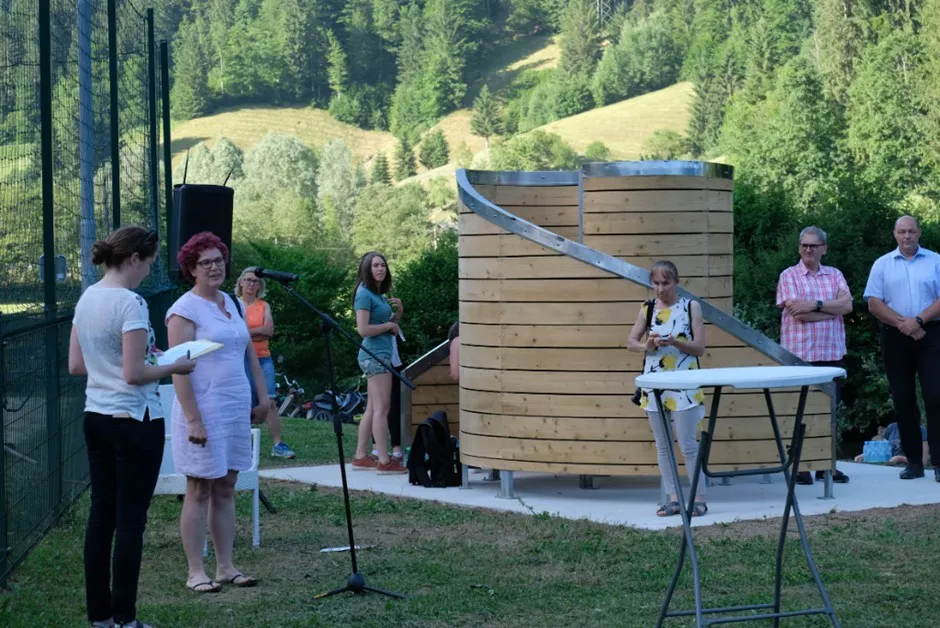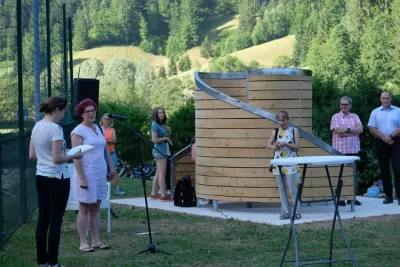Summary
The ‘Wooden Phoenix’ project promoted sustainability and circular-economy practices in the rural area of Žiri, Slovenia, repurposing wood waste into urban infrastructural elements such as benches and deckchairs. Led by the Cooperative Lokatur, the project fostered innovation and integrated local traditions such as wood craftsmanship into its activities, through strong partnerships with local government, NGOs, and educational institutions.
Educational events engaging 600 participants highlighted the benefits of re-using materials and adopting circular-economy practices. Involving students in the design and production of urban infrastructure reinforced sustainability values and entrepreneurial skills.
Results
- Creation of 20 benches, nine deckchairs, and a wardrobe from salvaged wood residues;
- Engagement of 600 individuals through educational activities, including eight lectures and film screenings;
- Production of a short film documenting the project’s impact on wood re-use and circular-economy practices;
- Enhanced local community spaces, benefitting residents and visitors while reducing environmental impact;
- Demonstrated the potential for circular-economy practices to be replicated in other rural regions.
Resources
Documents
Context
Industrial plants in Žiri and its surrounding areas generate a significant quantity of high-quality wood residues which are valuable raw materials. However, much of these materials are either discarded in landfills or burned in furnaces, leading to environmental degradation and the release of pollutants. In addition, exposed wood often gets contaminated with coatings, complicating its re-use and disposal.
These challenges are further exacerbated in rural areas such as Žiri due to limited awareness of circular-economy practices and insufficient collaboration between industries and communities hindering sustainable solutions. The ‘Wooden Phoenix’ project directly addresses these issues by transforming salvaged wood into functional urban infrastructure. The approach reduces waste, promotes sustainability, and fosters community engagement in adopting environmentally responsible practices.
Objectives
- Reduce wood waste and promoting re-use through circular-economy practices;
- Pilot a model for transforming wood residues and salvaged wood into functional and sustainable urban infrastructure that enhances community spaces for residents;
- Raise awareness of sustainable resource management through educational activities for local residents;
- Strengthen collaboration between businesses, educational institutions, and the local community.
Activities, key actors, and timeline
- The ‘Wooden Phoenix’ project kicked off with an analysis of the local environmental situation, including stakeholder consultations with local businesses and schools.
- The pilot phase to repurpose industrial wood residues and waste into urban infrastructure was launched following the research phase. Local businesses and schools collaborated in the design and manufacture of benches and deckchairs from salvaged materials. Students were also involved in the production process within these local businesses and as part of their vocational education.
- The products developed during the pilot were installed in public spaces to enhance community areas and promote sustainability.
- Educational activities, including roundtables, lectures, and film screenings, engaged the community and raised awareness of the importance of re-using materials. A short film documenting the project’s process and impact further extended its reach.
- Strong partnerships between the Žiri municipality, the Development Agency Sora, Cooperative Lokatur, and the School Centre Škofja Loka were key to ensuring the project’s success. Their collaboration facilitated knowledge transfer, innovation, and the promotion of circular-economy practices in the region.
Success factors/lessons learnt
- The project’s focus on practical applications such as creating functional community structures highlighted the tangible benefits of circular-economy practices which provide long-term improvements to public spaces and enhanced experience for both residents and tourists.
- Integrating local traditions such as wood craftsmanship strengthened the project’s cultural relevance and community engagement.
- Collaboration among businesses, educational institutions, and the local community was critical to fostering innovation and ensuring project success. Involving young people in design and production reinforced entrepreneurship and sustainability values.
Contacts
- Barbara Florjančič, barbara.florjancic@las-pogorje.si, +386 03 459 259

